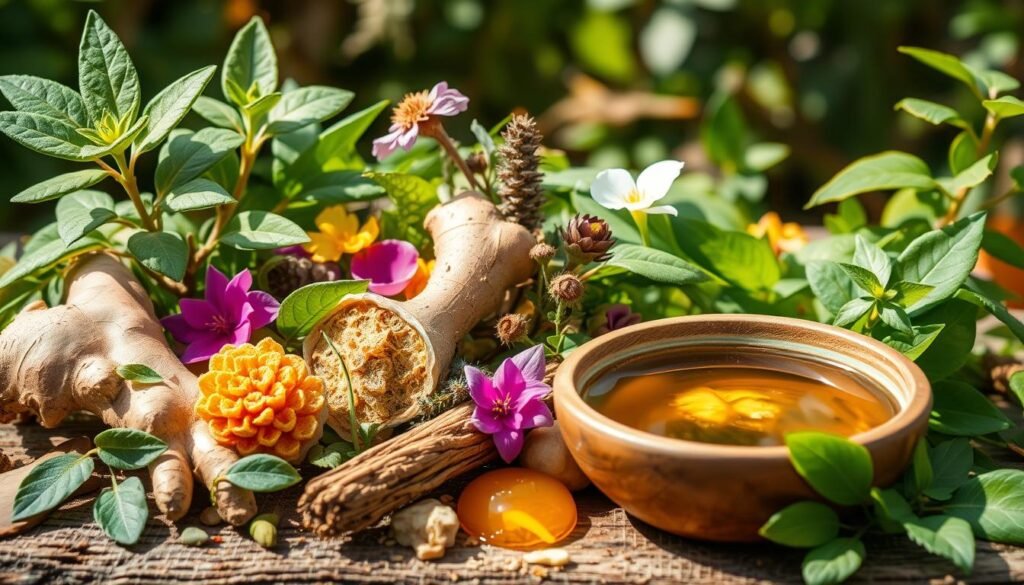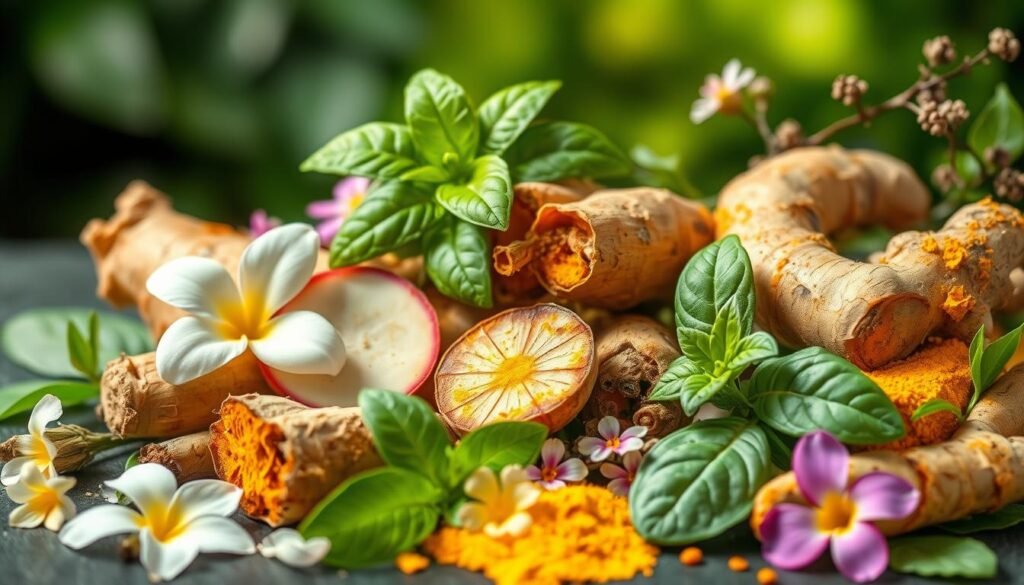In the city, pollution and allergens attack your lungs without warning. Severe dry cough, or Shushka-Kasa, can be a constant problem. Ayurveda offers a natural solution, using elements from nature to help you breathe easier.
Ayurveda has ancient remedies for dry cough. Honey Ginger Tea combines honey’s healing with ginger’s power to reduce inflammation. Turmeric Milk, or “golden milk,” is another favorite, packed with antioxidants and anti-inflammatory properties. Garlic is also a strong ally, fighting the infection that causes your cough.
Key Takeaways
- The therapeutic nature of Honey Ginger Tea and Golden Milk against severe dry cough1.
- Garlic’s capability to combat the underlying infection causing the dry cough1.
- Natural, non-pharmacologic methods such as Licorice Root and Cinnamon with Honey offer sweet respite for an irritated throat1.
- Pippali, not as well-known, serves as a beacon of improvement for respiratory function and alleviates cough symptoms1.
- Simple yet effective, Saltwater Gargles provide relief by reducing throat inflammation1.
- Integrating Ayurvedic cough relief remedies may align with current wellness industry trends, offering an alternative for health-conscious consumers1.
Understanding Severe Dry Cough in Ayurvedic Terms
Ayurveda is over 3,000 years old and offers a holistic approach to health. It uses herbal remedies, exercises, and lifestyle changes for dry cough2. Ayurveda aims to fix imbalances in the body, which can cause dry coughs2.
In Ayurveda, severe dry cough is called ‘Vataja Kasa’. It’s caused by an imbalance of Prana Vayu and Udana Vayu, important for breathing2.
Things like allergens can make Vataja Kasa worse. Symptoms include phlegm, chest burning, and pain. Ayurvedic treatment aims to ease these symptoms and fix the imbalance2.
Even though science doesn’t fully back it, some Ayurvedic practices and ingredients help with breathing. Tulsi (holy basil) can help with phlegm, and Ginger has anti-inflammatory properties2.
Sudarshana powder, with 53 herbs, is used to fight fever and other symptoms. It’s used for severe dry cough in Ayurveda2. But, it’s important to be careful with herbal remedies, especially for kids2.

Home remedies are key in Ayurveda. Honey tea, saltwater gargles, and steam inhalation help right away2. Using bromelain from pineapples or peppermint is also becoming popular for natural health2.
More people are choosing Ayurveda for dry cough. They prefer natural ways to manage health over medicine2. Ayurveda offers deep healing that connects ancient wisdom with today’s needs.
Ayurveda Remedy Severe Dry Cough and Its Significance
Exploring ayurvedic remedies for cough requires understanding its roots. Ayurveda, a traditional healing system from India, explains that a dry cough comes from a body imbalance. This imbalance, in the respiratory system, is called ‘Vataja Kasa’.
Identifying Vataja Kasa: Dry Cough in Ayurveda
Dry cough, or Shushka-Kasa, is common in cities due to pollution and allergens. Symptoms include phlegm, a burning chest, and tiredness3. Ayurveda sees these as signs of an imbalance caused by air and space elements. It suggests holistic ways to relieve cough.
The Role of Prana Vayu and Udana Vayu in Respiratory Health
Ayurveda says Prana Vayu and Udana Vayu are key for breathing health. An imbalance can cause chronic dry cough34. To fix this, Ayurveda recommends herbs like Draksharishta and Talisadi Churna. These herbs aim to balance these energies and ease symptoms3.
Natural Resistance: Building Immunity through Ayurveda
Boosting your immune system is key in Ayurveda for fighting off infections. Eating warm, nourishing foods and practicing Pranayama help your body fight off threats. These changes are vital for staying healthy3.
Using remedies like warm milk with turmeric and honey or Licorice root can help fight cough. Starting an Ayurvedic routine with these remedies can lead to better health. It can make coughs less severe and shorter.
Top Ayurvedic Herbs for Cough Relief
Looking for home remedies for dry cough? The ayurvedic treatment approach for dry cough has many natural solutions. These not only help with symptoms but also boost your body’s health. Some herbs and common items are especially good for this.
| Herb/Ingredient | Properties | Usage |
|---|---|---|
| Tulsi (Holy Basil) | Immunomodulatory, Expectorant | Tea, Infused Water |
| Honey | Antioxidant, Cough suppressant | Mixed in Tea, Turmeric Milk |
| Licorice (Mulethi) | Expectorant, Soothing Agent | Chew as Stick, Powder in Decoction5 |
| Pippali | Mucus Relief, Respiratory Support | Combined with Honey or Ginger5 |
| Ginger | Anti-inflammatory, Airway Widener | Freshly Crushed in Tea6 |
| Cinnamon | Antiviral, Anti-inflammatory | Grounded in Warm Beverages |
These home remedies for dry cough use things you might have at home. Adding them to your day can help a lot. Drinking Tulsi tea, for example, can calm your throat and boost your immune system.
Ayurvedic treatment approaches for dry cough also suggest making healthy choices. Drink plenty of water, eat foods full of vitamin C, and get enough sleep. These help your body fight off illness better5.

- Gargle saltwater to ease throat inflammation56.
- Regular exercise to keep the immune system robust.
- Consider meditation or yoga to reduce stress levels, enhancing overall health5.
Using these ayurvedic treatment approaches for dry cough can give you natural relief. When you live a balanced life, you can even stop dry cough before it starts.
Home Remedies for Dry Cough You Can Try Today
If you’re looking for effective ayurvedic remedies for cough, home remedies are a great option. Cold weather can make cold and cough symptoms worse. Knowing home remedies for dry cough can help when you need it most7.
Understanding dry coughs, which don’t have mucus, helps choose the right remedy. This can soothe an itchy throat and ease discomfort7.
Merging Warmth and Healing: Turmeric, Honey, and Milk
Golden Milk, made with turmeric and milk, is a well-known remedy. It uses turmeric’s anti-viral and anti-inflammatory properties to fight infections8. Honey adds to its soothing effects, making it both healing and comforting.Learn more about natural remedies you can make at home.
Licorice Magic: Mulethi’s Soothing Properties
Licorice root, or Mulethi, is a top natural cough relief choice. It soothes the throat and reduces irritation from coughing. It’s also good for asthma and sore throats7.
Cleansing Breaths: Steam Inhalation and Eucalyptus
Steam inhalation with eucalyptus oil is great for clearing congestion. Eucalyptus oil refreshes and opens airways, improving breathing. It offers temporary relief.Discover additional holistic practices for respiratory health.
These home remedies for dry cough are easy to make with common kitchen ingredients. Whether it’s Golden Milk or steam inhalation, they help with symptoms and boost your immune system. They’re perfect for the winter months78.
Lifestyle Adjustments to Complement Ayurvedic Treatment
Starting an ayurvedic treatment for severe cough is more than just treating symptoms. It’s about balancing your body, mind, and spirit. Adding lifestyle changes is key to boost the treatment’s power. These changes help you reach your health goals and find natural cough relief.
Staying away from allergens and irritants like smoke and strong perfumes is crucial. These things can make a dry cough worse. Eating less processed food and more nutrients helps your body fight off illness better.
Also, keeping a regular sleep schedule and eating at the same times every day is important. Ayurveda says to eat your last meal before sunset. This helps avoid toxins that can make coughs worse9.
Drinking enough water is vital for holistic remedies for severe dry cough. It helps thin out mucus, making it easier to cough up9. Using a humidifier can also help keep your airways moist and calm.
Eating foods high in vitamin C is another good move. They boost your immune system and help your body fight off infections that cause coughs9.
Yoga and breathing exercises (Pranayama) are also great for your lungs. They help you breathe better and manage cough symptoms9.
Learning these lifestyle changes can make your ayurvedic treatment for severe cough work better. It’s about making your environment support your body’s healing. This way, herbal remedies and Ayurvedic practices can work their best.
In short, making these lifestyle changes can change how you deal with a severe dry cough. It makes your health journey more effective and complete.
Conclusion
Ayurveda offers more than just quick relief for severe dry cough. It provides a complete healing experience. We’ve explored natural healing paths, showing how Ayurveda uses herbal remedies for dry cough. Each remedy is chosen for its special healing powers and fits well with Ayurvedic beliefs.
Tulsi, or holy basil, is a standout for its ability to ease cough symptoms. It has immunomodulatory, antibacterial, and expectorant qualities10. Ginger tea also helps, soothing the throat with its anti-inflammatory and antimicrobial effects10.
Honey in your tea adds sweetness and brings antibacterial and anti-inflammatory benefits10. Mulethi tea is another good choice, calming and soothing the throat10. Seasonal changes, like winter, are when Ayurveda’s benefits are most noticeable, helping with cold and flu symptoms that can lead to dry coughs11.
When using Ayurvedic remedies for cough, remember how lifestyle and daily activities can affect symptoms. Air pollution, what you eat, and even how you breathe at night are important11. By following Ayurvedic practices, you’re not just treating symptoms. You’re improving your health and finding balance with nature.
